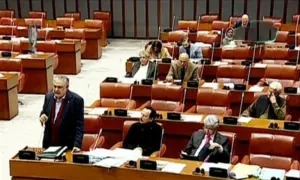Speakers urge for sustainable infrastructure across the snow leopard habitat

sustainable infrastructure across the snow leopard habitat
Gilgit, (June 17 2021): Speakers urge for sustainable infrastructure across the snow leopard habitat at a two-day Consultative Workshop on Infrastructure Development in Snow Leopard Home Ranges in Pakistan.
“Initiatives for conservation of the snow leopard will not only improve the population of the species, but are also essential for the survival and health of people and other wildlife”. This was stated by Raja Zakaria Maqpoon, Senior Minister Forests and Wildlife, Gilgit-Baltistan, during the consultative workshop, organized by WWF-Pakistan, at a local hotel in Gilgit.
The minister pledged to provide support for snow leopard conservation initiatives across its range in the country and emphasized on the need to raise awareness among local communities for the conservation of this iconic species.
The workshop was attended by representatives of the government departments, members of the provincial assembly, experts from the WWF Network, researchers, academia, and members of civil society organizations and the representatives of local communities.
The workshop aimed to identify the impacts of infrastructure development in the snow leopard home range, review present strategies for their conservation and the protection of their habitat, and devise a roadmap for future mitigation plans through consultation with different stakeholders.
Speaking on the occasion, Nazir Ahmed, Deputy Speaker, Gilgit-Baltistan Assembly shared that the region is home to diverse biodiversity and stunning landscapes, where three mountain ranges meet in Gilgit-Baltistan and provide rich habitat to the snow leopard population.
He also said that the Gilgit-Baltistan government is promoting ecotourism in the area and working towards improving forest cover and protecting wildlife.
Rab Nawaz, Senior Director Programmes, WWF-Pakistan stressed on the urgent need to undertake effective mitigation measures to conserve the snow leopard population, of which only 200 to 400 could be left in Pakistan. He also added that there is a need to work with multiple stakeholders across the life cycle of infrastructure development projects to ensure that planning and design is wildlife-friendly.
The workshop also included messages from experts from the WWF Network. Richard Nash, Technical Lead in the Governance Practice, WWF International, highlighted the importance of snow leopards in supporting the overall health and management of high-altitude landscapes.
Richard Nash deplored that unfortunately, snow leopards and their habitats are under increasing pressure, particularly from the development of infrastructure projects. He emphasized that joint initiatives should be implemented to address these challenges, adding that understanding the entire landscape and ecosystem of the home range is critical for positive gains for both people and nature.
Over 100 Years of Snow Leopard Research
A recently released WWF report titled, “Over 100 Years of Snow Leopard Research – A spatially Explicit Review of the State of Knowledge in the Snow Leopard Range” revealed that more than 70 per cent of snow leopard habitat remains unexplored. The reports also pointed out that there is a need to do more research on emerging threats to the species, including climate change and infrastructure development.
Recommendations of panelists
During the consultative workshop, the panelists during the technical session recommended establishment of integrated knowledge management system to collate research.
The panelists also urged for a joint action plan between all stakeholders to mitigate the impact of infrastructure. They also suggested a working group for advocacy and collaboration in the future, focusing on green and sustainable infrastructure in the snow leopard habitats.
The participants also agreed to develop a roadmap so that the infrastructure development in the snow leopard habitat is sustainable.
Closing the two-day workshop, Fateh Ullah Khan, Minister for Planning and Development, Government of Gilgit-Baltistan welcomed the recommendations and showed his commitment to implement them.




